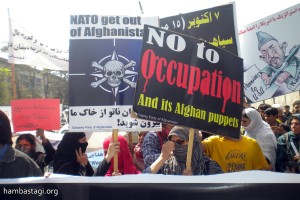Malala and Crisis of Feminist Politics
Malala yousafzai, a Pakistani activist working for women’s rights and education, was awarded the Nobel Peace Prize in October, 2014, which she shared with Kailash Satyarthi, a children’s rights activist from India, making her the youngest ever laureate in history. The media celebrated the achievement as a victory of her battle against the suppression of women and denial of the basic human rights especially those of Muslim women. The 17 year old school girl dominated the headlines for getting shot in her head by the Taliban militants in 2012 for campaigning bravely for the rights and education of girls. She had apparently written against the Taliban’s harsh educational policies on the BBC’s Urdu website which led to her assassination attempt. What followed was her emergence as a world famous figure and her growth into an embodiment of liberated, progressive Muslim woman fighting for the rights and education of millions of young women worldwide. The spotlight of liberal media the world over fell on her image as a sad target of Taliban brutalities and its tribal savageries. The media reported extensively on the male dominance or better to say, chauvinism, prevalent in the Swat province of Pakistan that denies rights, especially those of education and freedom to women as if that had been happening for the first time there. It wouldn’t be wrong to reiterate the fact that the media played it up for political motives.
Discourses supporting and opposing the feminist politics around the symbolic value of Malala have been going on for two years. The debates were mainly centered around the lives and the struggles for freedom of women in the Pak-Afghan border: a hot topic for discussion as well as a tasty bone of contention among the world leaders since the Trade centre attacks on September 11, 2001. The US began the Afghan invasion soon after the incident and the then US President George Bush justified the move as a righteous course of action to save the Muslim women and children from the clutches of the Taliban, which was ruling Afghanistan at that time. However, post-colonial feminists as well as Islamic Feminists brushed aside downright the imperialistic feminism represented by Bush and the justification of invasion that such a feminism pawned.
This is the context of the criticism posed against the global political discourse in which everyone, including the US president Barack Obama gains the right to easily speak ‘for’ all Muslim women with reference to the attacks against Malala. According to Pak-American feminist Mara Ahmad, it was not the eleven year old’s dream or her idea to blog about her struggles for freedom. The blog was a by- product of hatred for the activities of Taliban in the Swat province of her father Yousafzai and Abdul Hai Kakkar, the BBC’s Urdu service correspondent in Peshawar. She adds that after the assassination attempts, the political discourses concerning Malala became a hot topic tailored for the interests in Pakistani politics and the politics of Euro American societies. Women’s right and children’s right were all reframed and renarrated as per the agendas set by the global politics.
Mara Ahmad’s questions have deeper socio-political significance than her mediated image as being a product of American-Paki political situations. Muslim woman is always thought about as or discussed in relation with the levels of suppression she is subjected to. The staple image of Muslim families in the media, especially in films, is their being conservative and orthodox ill-treating their women using harsh principles of Islam, which is therefore, often branded as a religion that curtails her rights and freedom so much so that the saviors from ‘outside’ had to come to their rescue. But no such thing can be seen in the case of Malala. Despite all the discernible realities, Malala and her family, especially her father Yousafzai, is always presented as a cheerful, liberal and progressive Muslim man permitting and encouraging his daughter to fly high. While Yousafzai is given copious media attention, Malala’s mother as well as her brothers has stayed almost invisible to the public eye. This irony has frequently invited criticisms of the feminists. Question, as to why the usual feminist clichés don’t hold in Malala’s case, is unanswered. The typical reading about a Muslim family as being violent and cruel is absent in the argument about Malala. How does Malala’s family remain safe from the values of patriarchy? Why is the liberal feminist reading of family as being a patriarchal institution conspicuously absent in the reading about Malala’s family? How does Malala’s father endear himself to the liberal feminists? It is because of his support for the US invasion? Many feminists read Malala only as part of their critique of Taliban. Since liberal feminists can’t answer these questions, their stance is often crticised as being entwined with the imperalist rationale.
I wonder why Malala remains unaffected by the questions usually thrown in educational institutions at a Muslim woman like me. How does she remain safe from the liberal critiques? If one reads the debates about Malala, one may feel bewildered by the scarcity of questions about the agency and authority of those who frame questions about Muslim women. These debates, which got fixed in the trait identification of Malala as, on the one hand, a creation of the US and as, on the other hand, a symbol of liberation, don’t go deeper into the complexity of the identity of Muslim women negotiated and constructed by the interlocutors of power such as family, patriarchy and manliness.
(Ummul Fayiza studies post graduation in politics at JNU)
Translated by: Shauqeen Mizaj
























Connect
Connect with us on the following social media platforms.